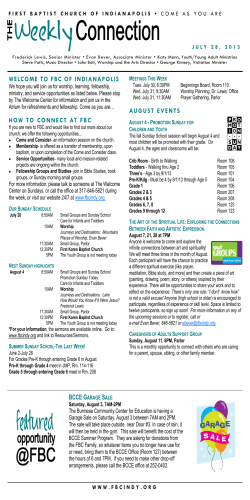
You Are My Sunshine
By Kendra Sparks A Year in the Life of Jasmine Spinner And I do! Prosopagnosia is a psychological disorder which affects a person’s ability to define and/or distinguish facial features. It is sometimes also called Face Blindness. In her poignant short story, You Are My Sunshine, Bridget Grace Sheaff introduces us to a young mother, whose son lives with this rare disease. This selection should be performed by a female and may be entered in either Prose Interpretation or Dramatic Interpretation. Think about the emotional toll any parent faces when dealing with a special needs child. It is natural for all parents to worry and fear for their child’s safety; however, with Prosopagnosia, every time a child leaves home, he is disconnected from the normalcy of recognizing someone he knows. For those living with this disorder, everyone encountered in the daily grind is in essence a stranger, until proven otherwise. This is a challenging selection, because there must be a fine balance between wanting to protect the child and, at the same time, preparing the child for a mainstreamed life in the future. If used in Prose Interpretation, the drama mask icons are simply visible to show the performer where to turn the pages in the manuscript. No one ever warned me about raising a boy. No one ever said, “Be prepared for dirt!” or “Buy extra Band-Aids” or “Don’t paint your walls white!” But that was all stuff I could have guessed. I mean, I could have guessed that a boy would be messy and rambunctious. I’m not stupid. I think the hardest part about raising a boy is that, as he grows up, you watch him become a man, like his father. Let’s be honest. He can’t become a man like his mother. No, no, that’s not how that works. You only have a little boy for, like, ten minutes, and then poof—he’s the spitting image of your husband. He looks just like him. He acts just like him. How are you supposed to get boys ready for adulthood? It’s like you get this gift from God for all of ten minutes, and then they’re all grown up and leaving the nest. If all you have is ten minutes, how on earth can you prepare them for life? Ten minutes. That’s what it feels like. Sometimes, it even feels like it’s less than ten minutes. Evan. We named him after my husband’s father. For those of you who don’t have children yet, that’s often how choosing the name for an unborn child works. We had no idea there was anything different with our son, until Evan was three. He had always seemed withdrawn. But that’s just, you know, something you can expect from small kids, right? Sometimes they’re shy around new people. It can be overwhelming, especially if You Are My Sunshine Some people play sports; some people march in the band. I’m just glad I had the chance to find my niche at last. Next year is going to be a blast! I’ll find my selections and memorize them perfectly. I’ll do everything I know I should do. If practice makes perfect, I’m willing to practice all summer long. NOTES By Bridget Grace Sheaff Our team finishes its season with a trophy case full of awards. At our end of the year banquet, I receive Best Novice of the Year. I accept it with humility and pride. Next year, I will be a veteran member of our speech team. And let me assure you, I mean business. Jasmine Spinner is going to be a winner! By Bridget Grace Sheaff You Are My Sunshine We went to see a pediatrician, and he referred us to another doctor, who then referred us to someone else, who finally told us that Evan was ‘face blind.’ Prosopagnosia is the correct scientific term. I had never heard this word before. Trust me. There is nothing more terrifying than hearing a doctor tell you that your one and only son has a psychological condition. Apparently, Evan doesn’t have the ability to recognize faces. He can look at you, and even if he saw you this morning or sees you every day—he doesn’t know who you are. He doesn’t have the ability to recognize Bill as his father. He doesn’t have the ability to recognize me as his mother. He lacks the ability to distinguish people by their faces. Something doesn’t connect with this part of his brain—the part that recognizes traits or differences in people’s faces—which, of course, explains his shyness and why he has so much trouble making friends. How can he possibly be expected to make friends? Evan doesn’t know who anyone is. Think about it. 99.99% of the world ‘s population is able to differentiate people by what they look like; however, for those rare few individuals living with Prosopagnosia, the only way to distinguish one individual from another is by a person’s mannerisms—or vocal variances. If you’re diagnosed with this psychological condition, you soon learn that very little can be done. There aren’t many options really. I mean, there’s no surgery, no drugs. What we must do for Evan is work with him—to try to retrain his brain in a different way. We hired a specialist who quizzes Evan on faces. She shows him two pictures, and then she asks Evan to point to his teacher or his grandfather. Evan only gets it right 50% of the time. For Evan, it’s really just a game of guessing. One time, I was standing in the room, and Evan couldn’t figure out which of the two pictures was me. He was so frustrated. So was Bill. Over spring break, Mr. Stovall makes a decision. I listen, as he tells me I’m ready to try a new event. He wants me to enter Dramatic. He tells me I’ve proved I can do great at performing Poetry. Now it’s time for me to take on the challenge of presenting tragedy. Acting is hard! So I look for a new selection and turn to the Bard. I decide to perform Ophelia from Shakespeare’s Hamlet. My strategy is to ham-it-up, as Ophelia slowly goes nuts. No ifs, ands or buts, I, Jasmine Spinner, have chosen my selection well. As far as I can tell, if Dramatic is anything like Poetry, I’ve found myself a winner. Ophelia’s monologue from Hamlet talks about death and flowers! Oh, the power of the mighty pen! Dramatic has been more challenging for me than Poetry. For a novice, however, I think I hold my own Against the varsity contestants. I don’t make it out of my prelim round, but I do learn a few things. This brings me to the events themselves. I assumed Dramatic and Poetry would be very much the same. The game itself, however, is very different indeed. Most all of the Dramatics are monologues. The majority of the contestants perform monologues About someone who lives with a mental or physical handicap. Other contestants perform monologues About someone who lives with a terminal disease, such as cancer or AIDS. The winning contestant performed a monologue About a person living with cancer, Who contracts AIDS during a bone-marrow transplant. And who can forget?— The character is also a mentally-challenged paraplegic! I’m no longer opposed to taking Kylie’s advice. A broken leg might have given me a leg-up against my competition! A Year in the Life of Jasmine Spinner I cannot describe to you the horror I felt at that exact moment. Evan didn’t know who I was. He had no idea. I called in Bill, my husband, and Evan hesitantly guessed that he was Daddy. We then showed Evan pictures of people he saw every day or almost every day. Nothing. There was no reaction. He had no idea who any of those people were. Go me! By Kendra Sparks you’re an only child. It’s perfectly normal to feel this way, right? Then one day, I came into his room. Evan looked up at me—and he was terrified. He looked at me, as if I was someone he had never seen before. I said, “Evan? Honey, are you okay?” He kept scanning my face, as if he was desperate for some indication as to who I was. Evan looked at me like that for a while, and then he said “Are you—are you my mommy?”
© Copyright 2026











